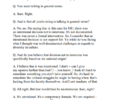- Joined
- Aug 31, 2011
- Messages
- 2,320
- Reaction score
- 3,875
There were a lot bad decisions along the way. School overlooked some weaknesses related to communication abilities in his application in order to increase diversity (which is fine by me), but did not seem to identify a specific plan from the outset to address those needs and set him up for maximum success in the later stages of his training (which is not fine by me). I think that, despite his good performance during the first few years academically, research-wise, and as a TA, the school should have anticipated and planned for his needs related to communication later in his training. While they may not have done anything illegal, and may have followed due process, ISU seems to have not had the resources necessary for a person of limited English proficiency to be successful. Yet they admitted him anyways. I think it was also a VERY questionable decision by that internship director to accept him to work with high risk patients when his documented difficulties with clinical skills would clearly put this population of patients at risk.


